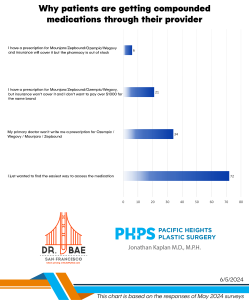
This recent Wall Street Journal article highlights the increasing competition in the neuromodulator market. A neuromodulator is the fancy term for a chemical used to relax facial muscles, thereby reducing wrinkles, ie Botox! In most industries, when you have more competition, that benefits the consumer by forcing lower prices. Will these competitive forces cause Botox to lower its price? Don’t bet on it!
Why more competitors won’t force Botox to lower it’s price
It is a natural assumption that with more options for a particular product, prices will go down. That’s why competition is good. But Botox is different. We’re most familiar with Botox for relaxing the wrinkles in between the eyebrows. Or treating a gummy smile. Or narrowing the jawline. But it has other uses that are less cosmetic.
Botox (and it’s competitors Dysport and Xeomin) are also great for medically necessary problems. Babies that have problems with bowel movements can get Botox to relax the anal sphincter. It can help with hoarseness. It’s an appropriate treatment for torticollis – a severe spasm of the neck muscles that causes the head to tilt. Medicare and other insurance companies will cover the cost of Botox for these medically necessary issues.
But because Botox has an agreed upon cost with the Federal government (Medicare) and other insurers, they have to be consistent with their financial practices. For example, if Medicare or an insurance company agrees to a certain cost for Botox, the makers of Botox can’t charge doctors a different rate. Said another way, if they charge the doctors less that are using Botox for cosmetic purposes, then the government or insurers won’t agree to pay a higher amount. Or at least it will bring up the uncomfortable conversation of why they’re charging one group one amount and more (or less) to a different group.
So they can either charge everyone (doctors, Medicare and private insurers) less, or charge everyone a higher rate to obtain a higher profit margin. Because the makers of Botox generate a lot of revenue from the medically necessary side of business, they don’t want to take a hit by lowering the cost to be more competitive with the cosmetic side of their business. Make sense? If not, comment below.
While we’re on the subject, check pricing on Botox and Xeomin from Dr. Kaplan by clicking here.
Click here for the original blog post written by Dr. Kaplan for BuildMyBod.




